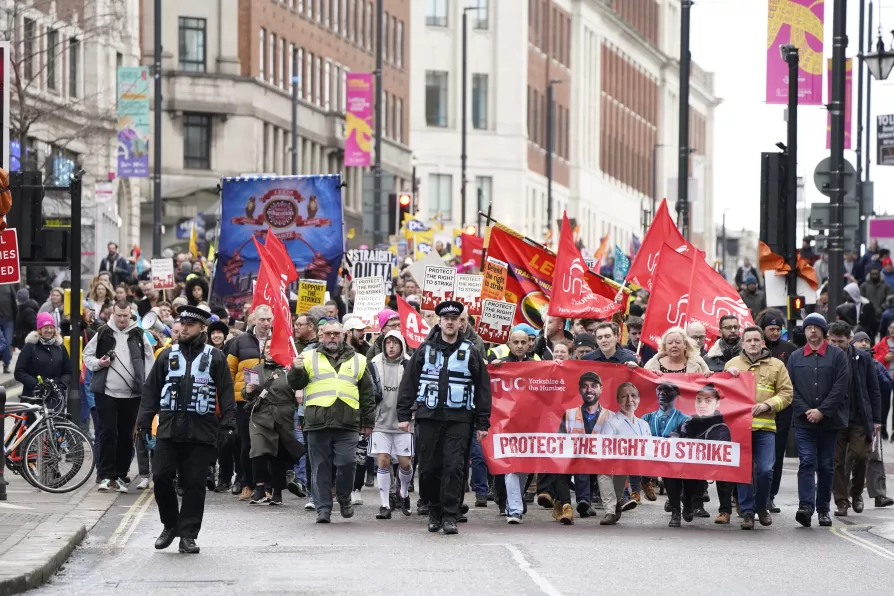
 Protesters during the Protect The Right To Strike march in Leeds, February 1, 2023
Protesters during the Protect The Right To Strike march in Leeds, February 1, 2023
IT APPEARS that at the meeting to finalise Labour’s election manifesto — with shadow cabinet, trade union representatives and members of the party’s NEC present — Unite the Union refused to endorse the package, with reservations about Labour’s constantly compromised policies on zero hours and “fire and rehire.” Labour’s position on the granting of oil and gas licences, a key issue for many of Unite’s members, also played a part.
At GMB congress delegates vented their fury at Labour’s candidate selection processes, which have left Labour voters with candidates with “no experience and [who] believe in nothing.” And in another warning to an incoming Labour government, delegates spoke in favour of NHS strikes unless pay talks proceeded with urgency.
These are two of Labour’s biggest affiliated unions and the sense among trade unionists that their concerns figure fairly low down in Westminster Labour’s priorities is pretty much the accepted wisdom.
The absolute independence from democratic accountability that the Parliamentary Labour Party flaunts before the party’s conference delegates and trade unionists alike is the calamitous constitutional condition that allows a Labour leadership to abandon partisanship in class politics and govern as if the interests of the wealthy and powerful can be reconciled with the needs of working people.
A tiny hint to the contrary is contained in Labour’s welcome bid to fund 100,000 nursery places at the expense of tax breaks to people who buy a privileged education for their children.
When the Tories seized on Emily Thornberry’s remark that this would result in extra pupils attending state schools, the correct Labour response would have been to celebrate this as a step towards a fully democratic school system that gave every child an equal change and double down to measures to drive class privilege out of education.
One of the problems that attend Labour’s leadership processes is the fact that trade union representatives on Labour’s NEC fall into two categories — those who represent the interests of their members and the wider working class to the Labour Party, and those who finish up as conduits for Westminster Labour’s class collaborationist approach to the interests of their union and the wider movement.
Sir Keir Starmer’s ruthless determination to make sure that the parliamentary party contains as few people with organic connections to the working class and even fewer with class conscious socialist politics as possible is already compromising Labour’s opportunity to complete the rout of the Tories in this election.
The very obvious lead Labour has in the opinion polls is giving licence for left-wing voters to cast a vote with less worry than usual that a Tory or Lib Dem might slip through with the progressive vote divided.
A Labour government — even one as compromised morally by the licence Westminster Labour extended to Israel’s genocidal war on the Palestinians — offers a better opportunity for the working class to impose its priorities on Parliament than one dominated by parties completely outside the influence of the organised working class and openly contemptuous of our class interests.
The received wisdom is that unless Labour’s candidate selection processes are democratised, the Parliamentary Labour Party shaped in Starmer’s image will exist for two decades. But unless the unions influence Labour more directly then we are locked into a perpetual cycle of debilitating compromises with capital and hope unfulfilled.
At the same time we know that it is the mass movement of working people acting independently that is the decisive factor in changing politics.
It was the anti-war movement, the anti-austerity campaigns, the fight against racism, the many battles for equality and liberation that drove the last great renaissance of Labour and will do so again.

Deep disillusionment with the Westminster cross-party consensus means rupture with the status quo is on the cards – bringing not only opportunities but also dangers, says NICK WRIGHT

In the run-up to the Communist Party congress in November ROB GRIFFITHS outlines a few ideas regarding its participation in the elections of May 2026

From Gaza complicity to welfare cuts chaos, Starmer’s baggage accumulates, and voters will indeed find ‘somewhere else’ to go — to the Greens, nationalists, Lib Dems, Reform UK or a new, working-class left party, writes NICK WRIGHT











